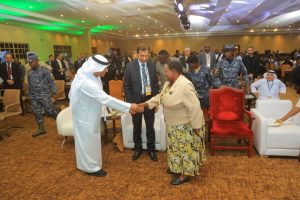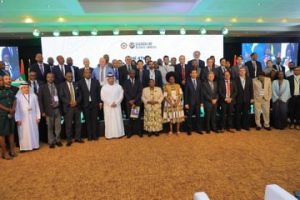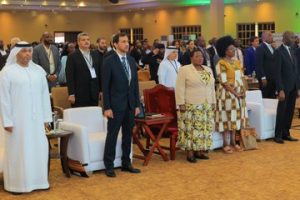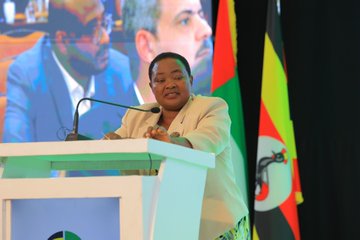Munyonyo – Prime Minister Rt Hon Robinah Nabbanja has officially launched the Karibu Newsletter for the Uganda-UAE Mission during the opening ceremony of the 4th Uganda-UAE Business Forum, a high-level platform aimed at boosting trade, investment, and economic cooperation between the two nations.
Prime Minister Nabbanja relayed warm greetings from President Yoweri Kaguta Museveni. “Uganda is proud to host this forum. This platform brings together government officials, business leaders, and policy makers from both nations to unlock opportunities and build bridges through trade and investment.”

Strengthening Uganda-UAE Relations
The Prime Minister emphasised the importance of deepening Uganda-UAE relations, noting recent high-level visits and agreements. “His Excellency General Yoweri Museveni visited the UAE more than once last year (2024), while His Highness Abdullah Bin Zayed Al Nahyan visited Uganda in May 2025. These visits culminated in the signing of six Memoranda of Understanding covering investment, capacity building, energy, transport, ICT, and visa waivers. These MOUs are clear indicators of our deep economic cooperation and shared commitment to sustainable development,” she said.
The forum coincides with the launch of the Karibu Newsletter, aimed at strengthening engagement and communication between Uganda and the UAE, fostering mutual respect and collaboration.
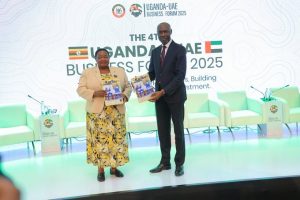
Uganda: Open for Business
Prime Minister Nabbanja highlighted Uganda’s investor-friendly environment and strategic advantages: Peace and Security —one of the most peaceful and secure countries in Africa. Economic Growth —ranked 7th among the fastest-growing economies globally, according to the IMF. Currency Stability—the Ugandan shilling remains one of Africa’s most stable currencies.
Investment Incentives —simplified business registration through the UGA One Stop Centre in just 24 hours; private investments yield an average 14% return per annum. Industrial Infrastructure — 19 operational industrial parks, with plans for more and Natural Advantages —Fertile soils, abundant freshwater, favourable climate.

“Uganda is open for business! With a peaceful and secure environment, rapid economic growth, and strong democratic values, we are the perfect investment destination in Africa,” she said.
Strategic Sectors for Investment
Aligned with Uganda’s 10-fold growth strategy, which aims to expand the economy from USD 61.3 billion to USD 500 billion by 2040, Prime Minister Nabbanja outlined key sectors for investment:
Agro-industrial development —commercial agriculture and value addition to agro-commodities. Tourism —targeting a fivefold increase in tourist arrivals. Mineral-based development —including oil, gas, and mining commercialisation, with first oil production expected by 2026 and the Pharmaceutical industry —expanding capacity and commercialisation.
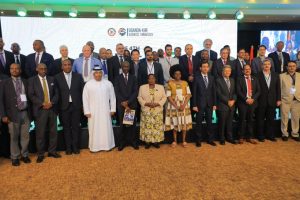
She also stressed the need for investment in critical enablers, including security, transport, electricity, irrigation, education, healthcare, domestic revenue mobilisation, regional integration, and environmental protection.
Youth and Employment
With 70% of Uganda’s population under the age of 30, Prime Minister Nabbanja emphasised that investment in these strategic sectors would create much-needed employment opportunities. “Industrial development and investment in these sectors will create jobs for our youth, supporting both economic growth and social transformation,” she said.

Invitation to UAE Investors
The Prime Minister extended a direct invitation to UAE investors, urging them to explore Uganda’s business opportunities and rich culture. “We invite our partners from the UAE to join us as we progress from lower-middle-income status to upper-middle-income status by 2040. During your visit, I encourage you to explore Uganda’s natural beauty and vibrant culture. Our country offers many attractions, including the source of the Nile,” she said.
The event marks a milestone in Uganda-UAE relations, reflecting growing bilateral trade—now USD 2.85 billion—and UAE investments totalling USD 3.5 billion across energy, infrastructure, healthcare, agribusiness, oil and gas, manufacturing, real estate, and tourism.
